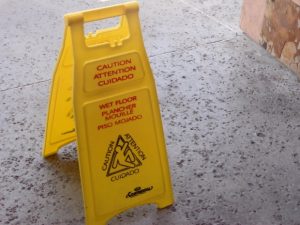In every negligence lawsuit in Florida, there are four basic elements plaintiffs need to prove: Defendant owed plaintiff a duty of care, defendant breached that duty, the breach caused plaintiff’s injuries and plaintiff suffered monetary damages (medical bills, lost wages, etc.) as a result. Slip-and-fall lawsuits in Florida, however, are a bit trickier, thanks to a 2010 legislative update that enacted F.S. 768.055. This provision refers specifically to premises liability cases wherein there is a “transitory foreign substance” (something slippery that isn’t normally there) on the floor of a business establishment. 
This statute modifies the business’s duties when invitees are hurt by transitory foreign substances. It shifts the burden of proof in constructive knowledge negligence actions fully on the plaintiff. More specifically, the proof of the “breach” element here is statutorily constrained to those cases wherein plaintiffs can prove either actual or constructive knowledge on the part of the business owner.
What does this mean? Essentially, it is not enough that you were invited onto the site for the benefit of the business and encountered a dangerous condition that resulted in an injury. What you are also responsible to prove is that the store either had “actual knowledge” (the business/ its agents created the dangerous condition or was specifically informed about it) or “constructive knowledge.” Constructive knowledge is a bit trickier. It means the business knew or should have known about the condition because either it existed for a certain period of time during which the business – in the course of using ordinary care – should have discovered it OR it was a condition that occurred with regularity so the business should have foreseen it. Continue reading
 South Florida Injury Lawyer Blog
South Florida Injury Lawyer Blog

